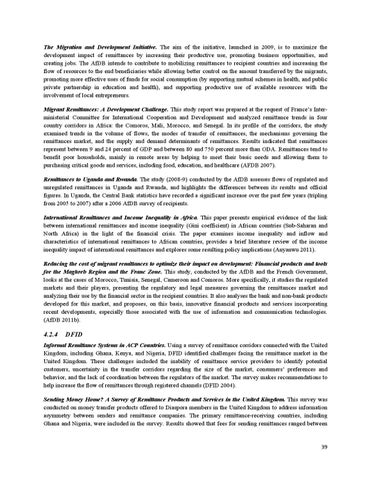The Migration and Development Initiative. The aim of the initiative, launched in 2009, is to maximize the development impact of remittances by increasing their productive use, promoting business opportunities, and creating jobs. The AfDB intends to contribute to mobilizing remittances to recipient countries and increasing the flow of resources to the end beneficiaries while allowing better control on the amount transferred by the migrants, promoting more effective uses of funds for social consumption (by supporting mutual schemes in health, and public private partnership in education and health), and supporting productive use of available resources with the involvement of local entrepreneurs. Migrant Remittances: A Development Challenge. This study report was prepared at the request of France’s Interministerial Committee for International Cooperation and Development and analyzed remittance trends in four country corridors in Africa: the Comoros, Mali, Morocco, and Senegal. In its profile of the corridors, the study examined trends in the volume of flows, the modes of transfer of remittances, the mechanisms governing the remittances market, and the supply and demand determinants of remittances. Results indicated that remittances represent between 9 and 24 percent of GDP and between 80 and 750 percent more than ODA. Remittances tend to benefit poor households, mainly in remote areas by helping to meet their basic needs and allowing them to purchasing critical goods and services, including food, education, and healthcare (AFDB 2007). Remittances to Uganda and Rwanda. The study (2008-9) conducted by the AfDB assesses flows of regulated and unregulated remittances in Uganda and Rwanda, and highlights the differences between its results and official figures. In Uganda, the Central Bank statistics have recorded a significant increase over the past few years (tripling from 2005 to 2007) after a 2006 AfDB survey of recipients. International Remittances and Income Inequality in Africa. This paper presents empirical evidence of the link between international remittances and income inequality (Gini coefficient) in African countries (Sub-Saharan and North Africa) in the light of the financial crisis. The paper examines income inequality and inflow and characteristics of international remittances to African countries, provides a brief literature review of the income inequality impact of international remittances and explores some resulting policy implications (Anyanwu 2011). Reducing the cost of migrant remittances to optimize their impact on development: Financial products and tools for the Maghreb Region and the Franc Zone. This study, conducted by the AfDB and the French Government, looks at the cases of Morocco, Tunisia, Senegal, Cameroon and Comoros. More specifically, it studies the regulated markets and their players, presenting the regulatory and legal measures governing the remittances market and analyzing their use by the financial sector in the recipient countries. It also analyses the bank and non-bank products developed for this market, and proposes, on this basis, innovative financial products and services incorporating recent developments, especially those associated with the use of information and communication technologies. (AfDB 2011b).
4.2.4
DFID
Informal Remittance Systems in ACP Countries. Using a survey of remittance corridors connected with the United Kingdom, including Ghana, Kenya, and Nigeria, DFID identified challenges facing the remittance market in the United Kingdom. These challenges included the inability of remittance service providers to identify potential customers, uncertainty in the transfer corridors regarding the size of the market, consumers’ preferences and behavior, and the lack of coordination between the regulators of the market. The survey makes recommendations to help increase the flow of remittances through registered channels (DFID 2004). Sending Money Home? A Survey of Remittance Products and Services in the United Kingdom. This survey was conducted on money transfer products offered to Diaspora members in the United Kingdom to address information asymmetry between senders and remittance companies. The primary remittance-receiving countries, including Ghana and Nigeria, were included in the survey. Results showed that fees for sending remittances ranged between
39
